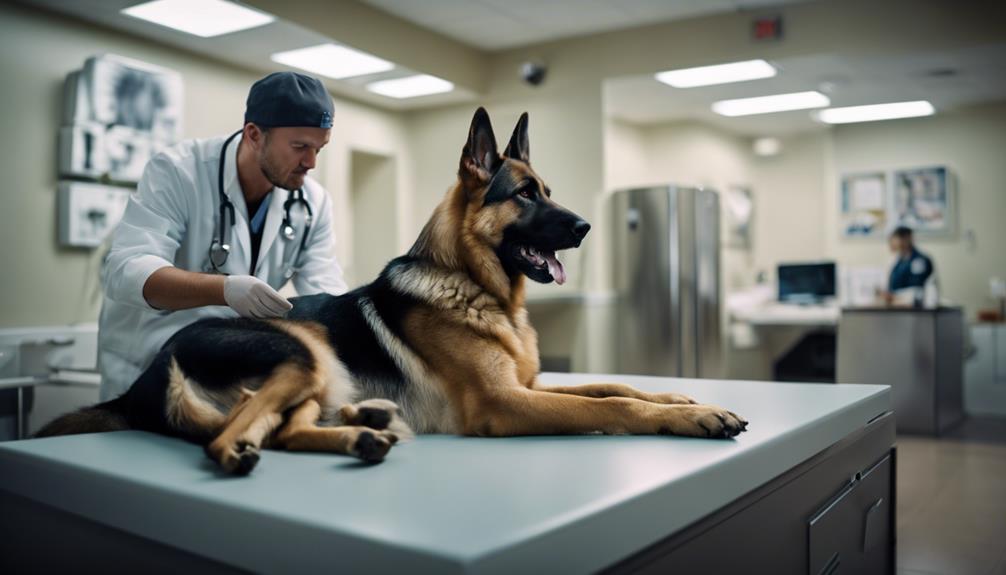🐾 Paw-some Partnership Alert! 🐾
As a pack of German Shepherd enthusiasts at MixGermanShepherd.com, we're always sniffing out the best products for our furry friends. Guess what? When you fetch something from Amazon through our links, we earn a little treat! 🦴
When it comes to German Shepherd mixes, their health can be like a puzzle with pieces inherited from their purebred lineage. From musculoskeletal challenges to potential genetic predispositions, these dogs can face a range of common health concerns. But what are the specific issues that may affect these mixed breeds, and how can you ensure their well-being? Let's explore the intricate health landscape of German Shepherd mixes and uncover ways to support their vitality and longevity.
Key Takeaways
- German Shepherd mixes are prone to hip dysplasia, requiring weight management and possibly surgical intervention.
- Neurological disorders like degenerative myelopathy need early detection and supportive care for spinal coordination.
- Gastric issues such as GDV demand prompt veterinary attention and prevention through feeding practices.
- Specific health concerns like perianal fistula and cauda equina syndrome highlight the importance of regular vet check-ups.
Hip Dysplasia in German Shepherd Mixes

German Shepherd mixes are particularly susceptible to hip dysplasia, a genetic orthopedic condition that affects the hip joints. Symptoms of hip dysplasia in German Shepherd mixes can include limping, difficulty getting up, and decreased activity. These signs may become more noticeable as the dog ages and the condition progresses. It's crucial to seek veterinary care if you observe any of these symptoms in your German Shepherd mix.
To properly diagnose hip dysplasia in German Shepherd mixes, your veterinarian will likely conduct X-rays and physical examinations. X-rays can reveal the extent of the hip joint abnormalities and help determine the most suitable treatment plan. Early detection of hip dysplasia is essential for managing the condition effectively and improving your dog's quality of life.
Treatment options for hip dysplasia in German Shepherd mixes may involve weight management, controlled exercise routines, and in severe cases, surgical interventions. By following preventive measures such as maintaining a healthy weight and avoiding activities that put excessive strain on the hip joints, you can help reduce the risk of hip dysplasia in your beloved German Shepherd mix.
Degenerative Myelopathy in German Shepherd Mixes

Degenerative Myelopathy, a progressive neurological disorder, affects the spinal cord of German Shepherd mixes, causing a gradual loss of coordination and control over hind limb movement. Management strategies focus on supportive care, physical therapy, and maintaining muscle strength to delay the progression of the disease. Genetic predisposition is a key factor in the development of Degenerative Myelopathy, emphasizing the importance of early detection and intervention for improved quality of life in affected German Shepherd mixes.
Degenerative Myelopathy Causes
Caused by genetic predisposition, the progressive spinal cord disease known as Degenerative Myelopathy commonly affects mobility in German Shepherd mixes. This condition, prevalent in the breed, results in hind limb weakness and eventual paralysis. The genetic link means that dogs with German Shepherd ancestry are more susceptible to developing this debilitating disease. Early identification of Degenerative Myelopathy is crucial for implementing effective management strategies. Regular veterinary visits can aid in monitoring the progression of the disease, allowing for timely interventions to improve the affected dog's quality of life. Below is a table summarizing key points about Degenerative Myelopathy in German Shepherd mixes:
| Degenerative Myelopathy in German Shepherd Mixes | |
|---|---|
| Commonly Affects | Mobility |
| Genetic Predisposition | Significant Factor |
| Symptoms | Hind Limb Weakness, Paralysis |
| Management Strategies | Early Detection, Veterinary Monitoring |
| Importance of Regular Check-ups | Essential for Progression Tracking |
Management Strategies for Degenerative Myelopathy
In managing Degenerative Myelopathy in German Shepherd mixes, focus on implementing supportive care, physical therapy, and mobility aids to improve their quality of life. Supportive care involves monitoring their condition, ensuring a comfortable living environment, and providing assistance with daily activities. Physical therapy aims to maintain muscle strength, flexibility, and coordination through tailored exercises. Mobility aids such as harnesses or carts can help support your dog's hind limbs and enable them to remain active. Regular veterinary check-ups are crucial for tracking disease progression and adjusting management strategies accordingly. While Degenerative Myelopathy has no cure, early detection and proactive management can significantly slow its advancement, enhancing the well-being of affected German Shepherd mixes.
Gastric Dilatation-Volvulus in German Shepherd Mixes

You must be aware of the bloat risk factors that can predispose German Shepherd mixes to Gastric Dilatation-Volvulus (GDV), a critical condition. Watch out for symptoms like retching, bloating, restlessness, and a swollen abdomen as they could indicate GDV in your dog. Immediate veterinary attention and emergency surgery are crucial for untwisting the stomach and restoring blood flow in cases of GDV.
Bloat Risk Factors
German Shepherd mixes face an elevated risk of bloat, a life-threatening condition known as Gastric Dilatation-Volvulus, primarily due to their deep-chested anatomy. Factors such as rapid eating, exercise after meals, and stress can contribute to the occurrence of bloat in German Shepherd mixes. Bloat occurs when the stomach fills with gas and may twist, leading to a blockage of blood flow and necessitating immediate veterinary attention. To prevent bloat in German Shepherd mixes, it is advisable to feed them multiple smaller meals, utilize slow feeder bowls, and avoid strenuous physical activity following meals. By implementing these preventative measures, you can help reduce the risk of bloat and safeguard the well-being of your German Shepherd mix.
Symptoms to Watch
With Gastric Dilatation-Volvulus (GDV) in German Shepherd mixes, recognizing early symptoms is paramount for swift veterinary intervention and the prevention of life-threatening complications. Symptoms to watch for include restlessness, unproductive vomiting, a bloated abdomen, and rapid breathing. German Shepherd mixes with GDV may also exhibit signs of weakness, lethargy, pale gums, and a distended abdomen, indicating a medical emergency. If these symptoms are observed, immediate veterinary attention is necessary, as GDV can progress to gastric torsion, cutting off blood flow and causing tissue damage. Emergency surgery may be required to correct the condition and save the dog's life. Monitoring for these symptoms diligently can help owners seek timely medical care and improve the chances of a positive outcome.
Emergency Treatment Options
In cases of Gastric Dilatation-Volvulus in German Shepherd mixes, prompt veterinary intervention is crucial to decompress the stomach and stabilize the dog's condition effectively. This emergency treatment aims to address the life-threatening complications associated with this condition, such as shock and organ damage. Surgical correction is often necessary to prevent future occurrences of Gastric Dilatation-Volvulus in German Shepherd mixes. Symptoms like restlessness, unproductive retching, abdominal distension, and rapid breathing should not be ignored, as timely recognition and swift action are vital in managing this condition. By seeking immediate veterinary care, you can improve the chances of a successful outcome for your furry companion.
| Emergency Treatment Options | Gastric Dilatation-Volvulus in German Shepherd Mixes |
|---|---|
| Prompt Veterinary Intervention | Decompression of the stomach and stabilization |
| Surgical Correction | Prevention of recurrence |
| Timely Recognition | Swift Action for a successful outcome |
Perianal Fistula in German Shepherd Mixes
Affected by a painful and common condition, German Shepherd mixes often face the challenge of perianal fistula, marked by open sores and inflammation near the anal area. Perianal fistula in German Shepherd mixes has a genetic component that predisposes them to this condition. When dealing with perianal fistula in your German Shepherd mix, here are some key points to consider:
- Symptoms: Watch out for signs like difficulty defecating, scooting, and foul-smelling discharge.
- Treatment: Management may involve medications, dietary adjustments, and sometimes surgical procedures.
- Genetic Predisposition: Due to the genetic link, German Shepherd mixes are more prone to developing perianal fistula.
- Regular Vet Check-ups: Routine veterinary visits are essential for early detection and effective management.
- Quality of Life: Timely intervention and proper care can significantly enhance your German Shepherd mix's quality of life.
Cauda Equina Syndrome in German Shepherd Mixes

Predisposed by genetic factors, German Shepherd mixes may develop Cauda Equina Syndrome, a condition impacting the spinal nerves at the base of the spinal cord. This syndrome in German Shepherd mixes affects the bundle of nerves that spread out from the end of the spinal cord, leading to symptoms like hind limb weakness, incontinence, and lower back pain. Affected dogs may struggle with walking, exhibit lameness, and experience a loss of coordination due to the spinal cord's compromised function. Treatment typically involves surgical intervention to relieve the pressure on the affected nerves, aiming to improve the dog's mobility and alleviate discomfort. Early detection is crucial in managing Cauda Equina Syndrome in German Shepherd mixes to enhance their quality of life. Regular veterinary check-ups and prompt intervention can help ensure the best outcomes for dogs affected by this condition, offering them a chance at a more comfortable and active life.
Epilepsy in German Shepherd Mixes

German Shepherd mixes with epilepsy can experience varying frequencies and severities of seizures due to this neurological disorder. Seizures in German Shepherd mixes with epilepsy may manifest as mild episodes of staring or more severe convulsions. The exact cause of epilepsy in German Shepherd mixes is often elusive but can be linked to genetic predispositions or underlying health conditions. Management of epilepsy in German Shepherd mixes typically involves a multi-faceted approach, including the use of antiepileptic medications, dietary modifications to support brain health, and regular veterinary check-ups to monitor the condition. Early detection of seizures, prompt initiation of treatment, and consistent adherence to the prescribed care plan can significantly enhance the quality of life for German Shepherd mixes living with epilepsy. Remember, providing a stable and supportive environment is crucial for managing seizures in German Shepherd mixes effectively.
Allergies in German Shepherd Mixes

Allergies in German Shepherd mixes can manifest as reactions to environmental factors or specific food ingredients, leading to symptoms such as itching, skin irritation, and digestive issues. Environmental allergies in German Shepherd mixes are often triggered by common allergens like pollen, dust mites, or mold. On the other hand, food allergies in these mixes can develop from proteins such as beef, chicken, or grains present in their diet. Managing allergies in German Shepherd mixes involves various approaches, including allergy testing to identify specific triggers, dietary changes to eliminate allergens, and medication to alleviate symptoms. By addressing both environmental and food-related allergies, owners can help their German Shepherd mixes lead more comfortable and healthy lives.
| Allergen Type | Common Triggers |
|---|---|
| Environmental | Pollen, dust mites, mold |
| Food | Beef, chicken, grains |
Cancer Risks in German Shepherd Mixes

Cancer risks in German Shepherd mixes are influenced by a combination of environmental factors, genetics, and age, making regular veterinary monitoring essential for early detection and management. German Shepherd mixes are at a higher risk of developing cancer compared to some other dog breeds. Common types of cancer in German Shepherd mixes include hemangiosarcoma, osteosarcoma, and lymphoma. Factors such as environmental influences, genetic predispositions, and the age of the dog all play a role in the increased cancer risks for German Shepherd mixes. Therefore, regular veterinary check-ups are crucial for detecting any signs of cancer early on. Being familiar with the common signs and symptoms of cancer in German Shepherd mixes can help pet owners seek timely medical intervention, potentially improving outcomes. Remember, early detection and prompt treatment are key in managing cancer risks in your German Shepherd mix.
Frequently Asked Questions
Do German Shepherd Mixes Have Health Problems?
Yes, German Shepherd mixes can experience health problems due to genetic predispositions. Regular vet visits help monitor issues. Consider dietary needs and exercise requirements as preventive measures. Understanding these aspects is vital for their well-being.
What Is the Most Common Problem in German Shepherds?
Hip dysplasia, allergies, and behavioral issues are significant concerns in German Shepherds. Regular vet visits aid in early detection and management. Proper care, exercise, and diet play vital roles in preventing and addressing these common health problems.
What Is the Life Expectancy of a German Shepherd Mix?
In a German Shepherd mix, the average lifespan varies, influenced by genetic factors and the quality of life you provide. Ensuring proper care, nutrition, and regular vet visits can help extend their years.
Are German Shepherd Mixes Good Dogs?
You've got a winner with a German Shepherd mix! These dogs are loyal, intelligent, and protective. Training tips can help harness their potential. Ensure ample exercise to keep them happy. Overcoming socialization challenges early on is key.
Conclusion
In conclusion, it is crucial to be aware of the common health issues that German Shepherd mixes may face, such as hip dysplasia, degenerative myelopathy, and gastric dilatation-volvulus. Early detection and proper management of these conditions are essential for ensuring the well-being of your furry companion. Remember, a stitch in time saves nine, so stay vigilant and proactive in monitoring your German Shepherd mix's health to promote a happy and healthy life for them.
